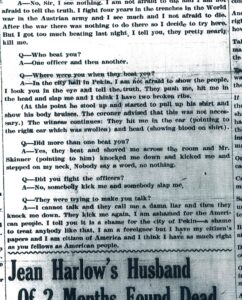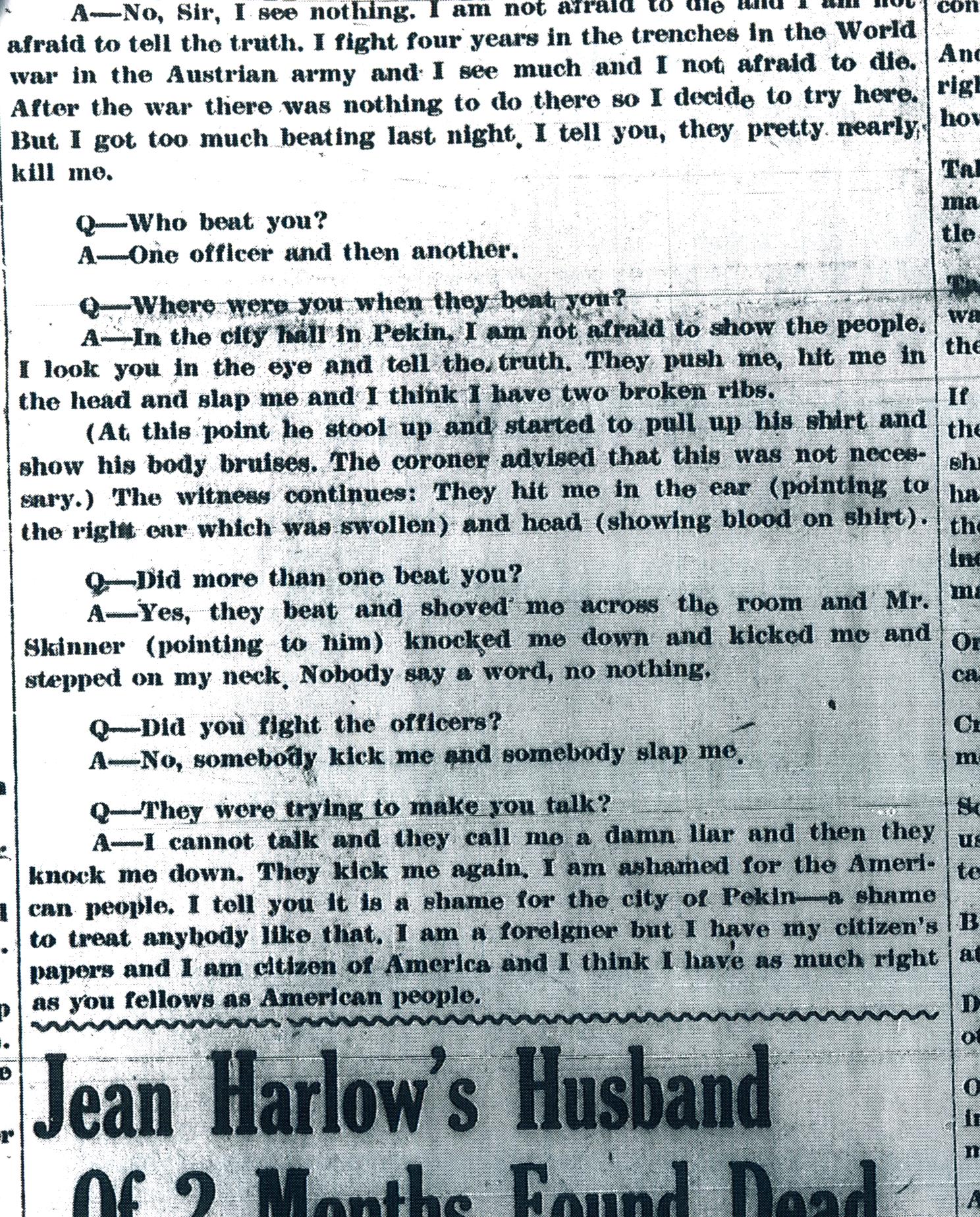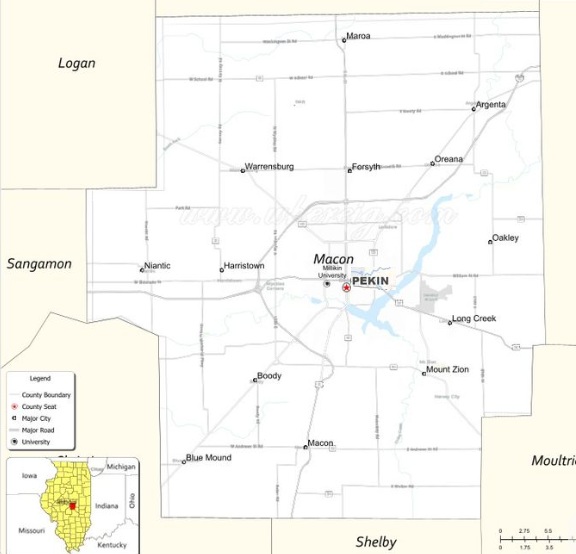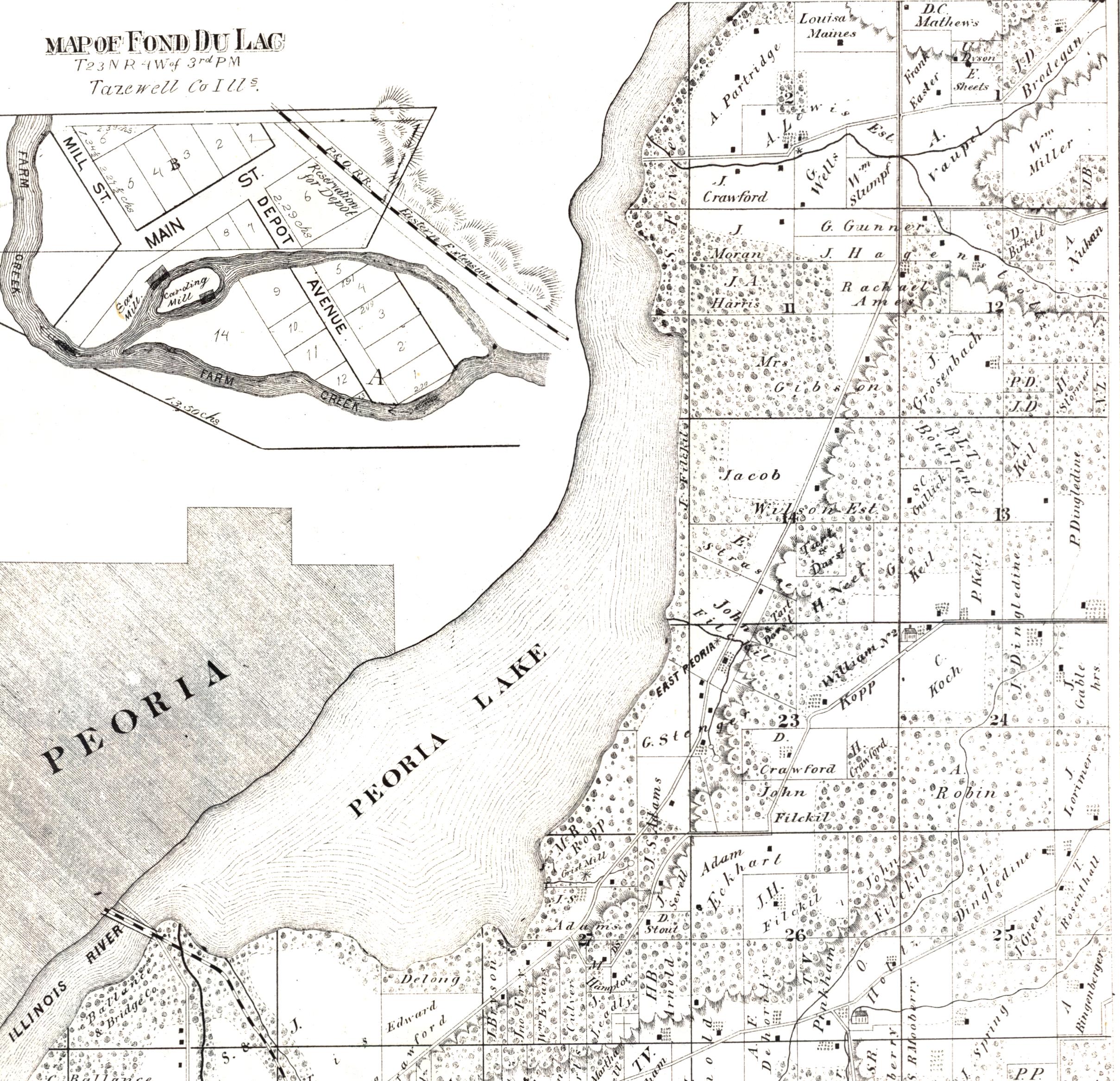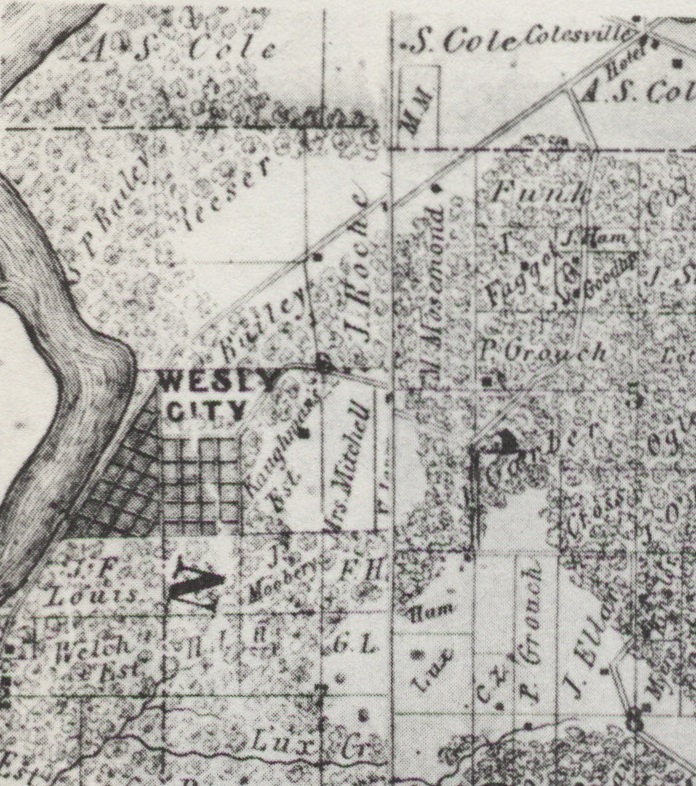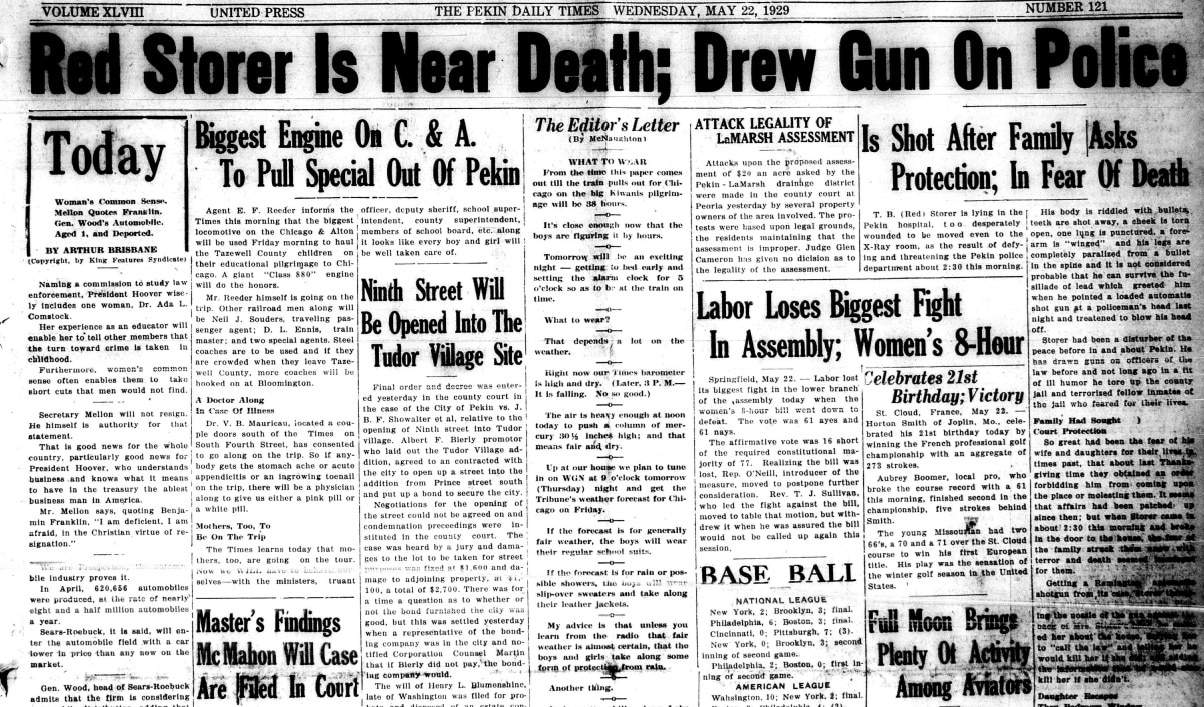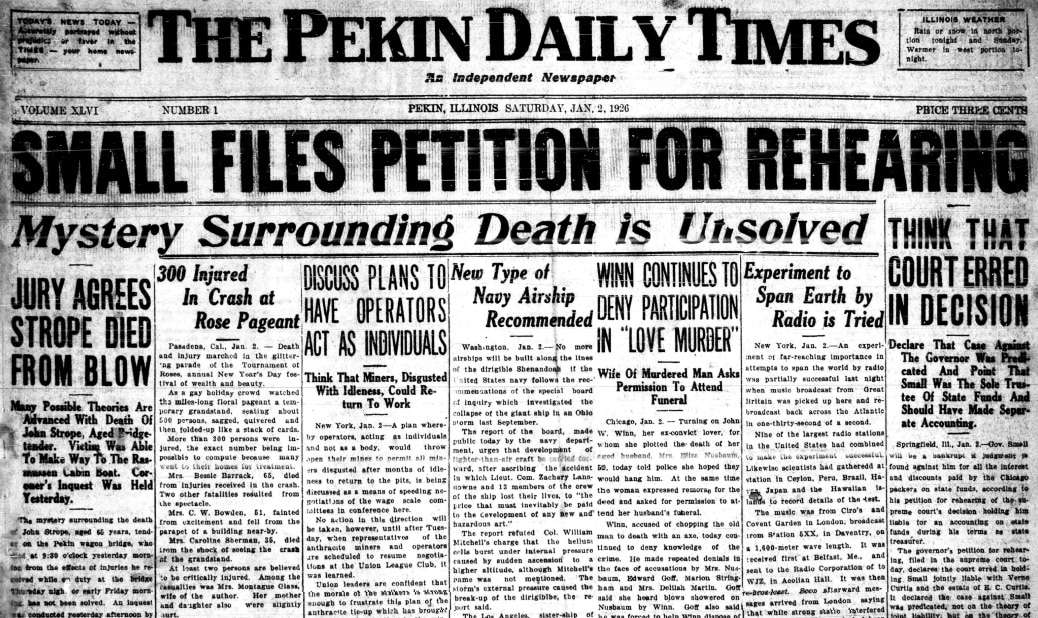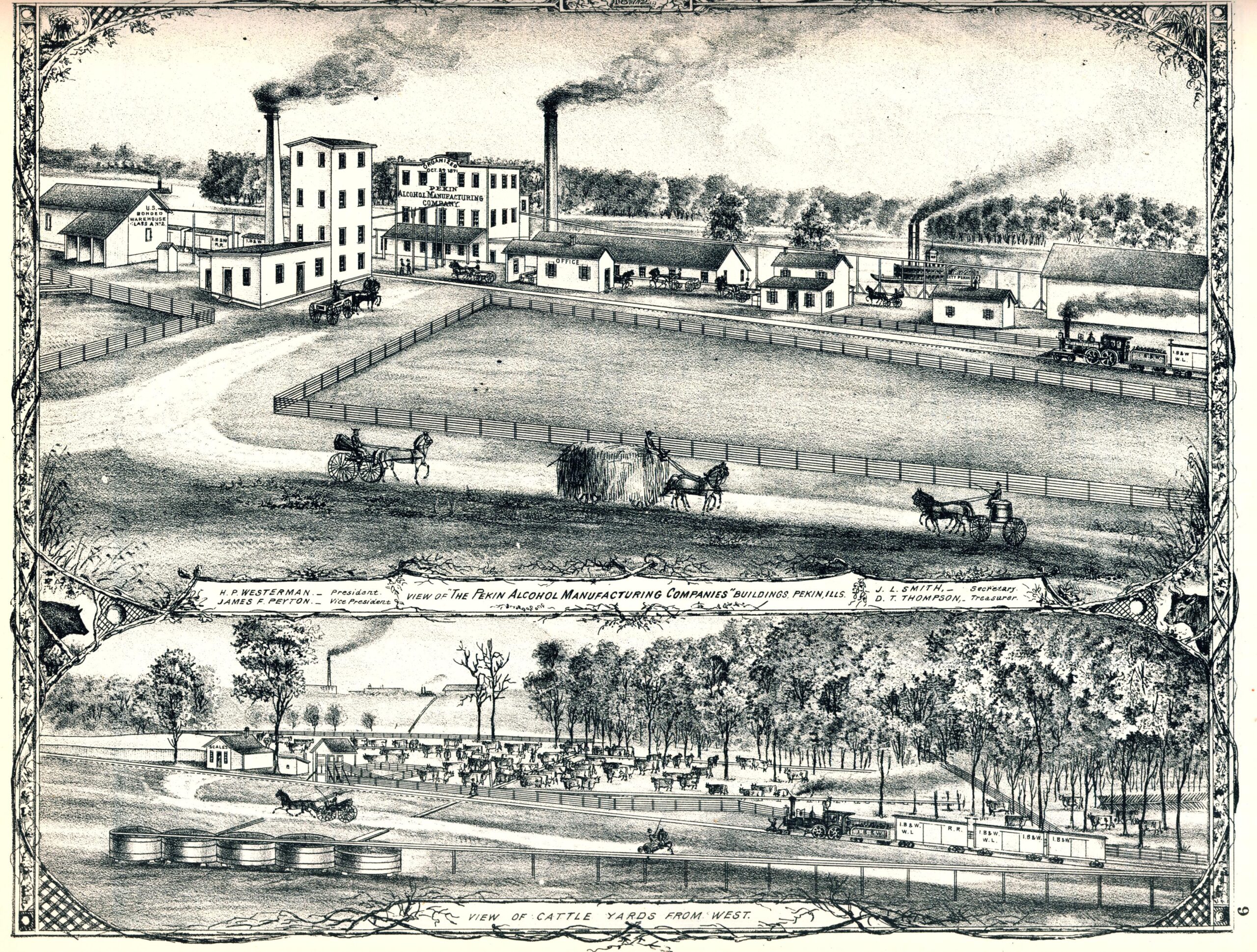With this post to our Local History Room weblog, we continue our series on a pair of sensational deaths that occurred in Pekin, Illinois, during the Prohibition Era. The Local History Room columns in this series, entitled “The Third Degree,” originally ran in the Saturday Pekin Daily Times from Sept. 15, 2012, to March 2, 2013.
THE THIRD DEGREE
By Jared Olar
Library assistant
Chapter Three
Martin Virant and the third degree
On Aug. 31, 1932, Tazewell County Coroner A. E. Allen held an inquest into the death of Lewis P. Nelan of East Peoria. At the inquest, the coroner’s jury heard testimony that on Aug. 27, Nelan had gone to the East Peoria speakeasy of John Petje, where he and Petje quarreled and fought.
According to the testimony, Petje struck Nelan on the head with an iron bar, knocking him unconscious. Mistakenly believing that Nelan was dead, Petje and his companions, Edward Hufeld and George Genseal, placed Nelan on the tracks in the East Peoria railyards so Nelan would be run over and his death appear to be accidental.
The facts of Nelan’s death were sensational enough – but those who attended his inquest were once more appalled and mortified by the testimony that they heard next.
After the coroner’s jury was presented with the reports of the investigators and the testimony and confessions of Petje, Keayes, Hufeld and Genseal, Coroner Allen called Martin Virant of East Peoria to testify.
Virant, a coal miner, was a lodger living above Petje’s speakeasy. Born Nov. 3, 1895, in the Austro-Hungarian Empire, the son of George and Rose Virant, he was an Austrian Army veteran of World War I but had become a U.S. citizen. He had a brother and a sister living in Peoria, as well as siblings in Europe.
In a front page story about the Nelan inquest, the Sept. 1, 1932 Pekin Daily Times reported, “According to the testimony of Deputy Sheriff Fleming, Martin Virnt (sic), who was being detained by the sheriff’s office for questioning, was named by Genseal saying that Virnt was present at the time of the fight and was talking to him.
“Virnt was brought from jail by deputy sheriffs, handcuffed. No warrant had been sworn out for him, but he was believed by the officers to have a knowledge of the fatal quarrel. . . .
“He was told by Coroner Allen that he did not have to testify if he did not want to, and asked if he wanted to say anything, to which he answered, ‘Yes.’
“Virnt appeared nervous and disturbed and at this juncture Attorney J. P. St Verny (sic – St. Cerny), altho not retained by Virnt, asked the witness if he had been threatened, Vrnt (sic) replying that he had been.
“Virnt said he was home the night of the fight, that he had talked to Petji during the evening, but that he went to his room and to bed between 9:30 and 10 o’clock. He said he knew nothing of the fight until the next morning.”
To learn why Virant “appeared nervous and disturbed” and who he said had threatened him, we will quote the transcript of Virant’s testimony that was published in full on the front page of the Sept. 6, 1932 Pekin Daily Times and the front page of the Sept. 17, 1932 Peoria Journal.
Virant said, “I’m not afraid to die and I am not afraid to tell the truth. I fight four years in the trenches in the World war in the Austrian army and I see much and I not afraid to die. After the war there was nothing to do there so I decide to try here. But I got too much beating last night I tell you, they pretty nearly kill me!
“Coroner Allen: Who beat you?
“A – One officer and then another.
“Q – Where were you when they beat you?
“A – In the city hall in Pekin. I am not afraid to show the people. I look you in the eye and tell the truth. They push me, hit me in the head and slap me and I think they have broken two ribs.
“(At this point he stood up and started to pull up his shirt to show his body bruises. The coroner advised that this was not necessary.) The witness continues:
“They hit me on the ear (pointing to right ear which was swollen) they hit me on the head (showing blood on shirt).
“Q – Did more than one beat you?
“A – Yes, they beat and shoved me across the room, and Mr. Skinner (pointing to him) knocked me down and kicked me and stepped on my neck.
(Note: Skinner was a big man, more than 6 feet tall and heavy, weighing more than 250 pounds, while Virant was about 5 feet 7, weighing 150 pounds.)
“Q – What did they say to you?
“A – Nobody said a word, no nothing.
“Q – Did you fight the officers?
“A – No. Somebody kick me and somebody slap me.
“Q – They were trying to make you talk?
“A – I cannot talk and they call me a damn liar and then they knock me down. They kick me again. I am ashamed for the American people. I tell you it is a shame for the City of Pekin – a shame to treat anybody like that. I am a foreigner but I have my citizen’s papers and I am citizen of America and I think I have as much right as you fellows as American people.”
Virant wanted to continue testifying about the torture he had endured at the hands of Deputy Charles O. Skinner and Deputy Ernest L. Fleming, but because Allen concluded that Virant knew nothing about Nelan’s murder, he sent Virant back to the county jail, expecting Sheriff James J. Crosby to release him.
Skinner and Deputy Hardy Garber took Virant back to the jail, placing him in Cell 11.
The next day, Virant was found dead in his cell – hanging by his own belt strap.
Next week: A hanging in Cell 11 — Crime and Cover-up at the County Jail.
